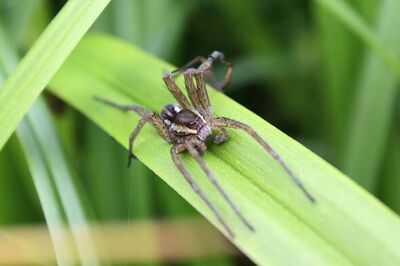A giant fish-eating spider is surging in numbers across the UK after being on the brink of extinction. The species, which can reach a leg span of up to 7cm, can run on water and are one of the largest in the nation.
Fen Raft Spiders were close to extinction in 2010 but have now made an "incredible comeback". There are believed to be up to 10,000 breeding females across the UK, including 3,750 at 12 sites across Norfolk, following successful conservation efforts. The Royal Society for the Protection of Birds (RSPB) reared hundreds of the baby spiders and hand-fed them tiny flies in individual test tubes.
As reported by the Oxford Mail, adult female Fen Raft Spiders can grow as large as the palm of your hand. They live off other spiders, damselflies, dragonfly larvae and even fish and tadpoles.
Fen Raft Spiders are semi-aquatic species and tend to live in wetlands across the South of England Wales. They have arich brown or black body, as well as white or cream striples along their side.
The spiders are able to sit on the surface of water due to their hairy legs. They can also walk or run across water to catch prey.
As they're dependent on a reliable, year-round supply of unpolluted water, Fen Raft Spiders have faced decline over recent decades. Their habitats have been impacted by global warming issues which has caused them to become a rare species.
The RSPB Mid Yare nature reserves site manager, Tim Strudwick, said: "The Fen Raft Spider is one of the UK's rarest invertebrates and we are proud of the role our reserves and teams have played in its recovery.

"These spiders have an important role in maintaining the rich aquatic diversity found in the grazing ditches on our reserves. The females are impressive in size, but also beautiful - they are truly special to see!"
He continued: "The spiders are only seen in the grazing marsh ditches and are fairly shy but are easier to see from June to September.
"Walking along the meadow trail gives visitors at Strumpshaw Fen the best chance of sightings of the mature females and their glistening nursery webs, so now is the perfect time to make a trip to the reserve."
Jane Sears, an RSPB ecologist, added: "The RSPB has played an important role in the reintroduction of these spiders and means we must continue to restore, manage and protect the wetland habitats where the Fen Raft Spider thrives to ensure the future of not just this species, but many others too."
You may also like

Horror as trailer collides with pram - three kids rushed to hospital

Lalu IRCTC scam 'fountainhead', says court as it frames charges

National Commission for Women flags lapses, seeks fast-track trial

Governer: Don't have confidence to say West Bengal is safe

Keir Starmer savaged over 'big fat socialist dreams' in digital ID takedown







